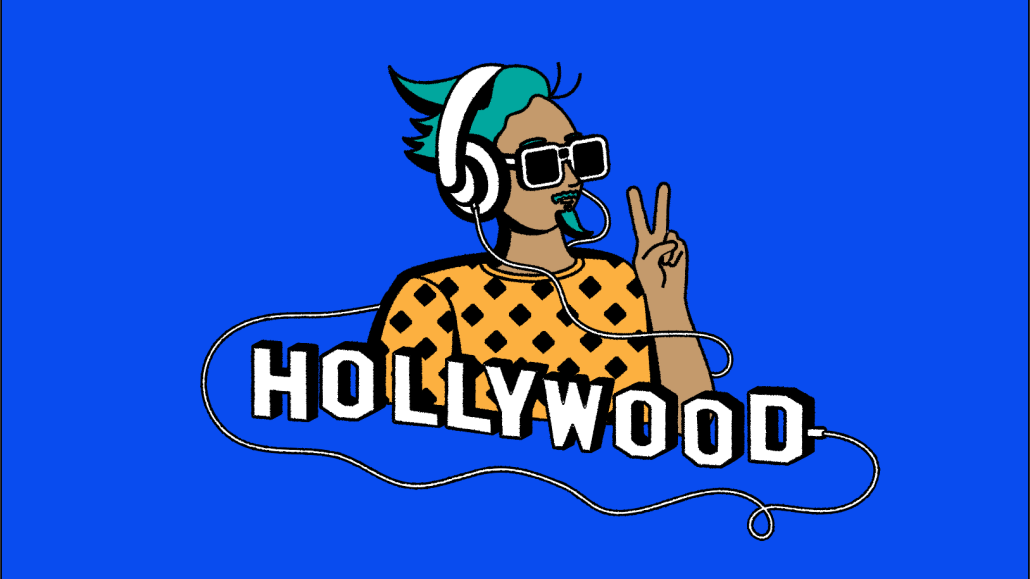Secure your place at the Digiday Media Buying Summit in Nashville, March 2-4
As gaming influencers rise in prominence, their podcasts provide new branding and sponsorship opportunities

Right now, everyone wants in on podcasts — including gaming influencers. For gaming and esports content creators who are well-established on Twitch and YouTube, podcasts create new opportunities to apply sponsorships and brand partnerships to a pre-existing audience.
Brian “FaZe Rug” Awadis is a high-profile example of a gaming influencer who has dived into the podcasting space in recent weeks. A co-owner of esports organization FaZe Clan, the 24-year-old Awadis is one of the most popular gaming creators on the web, boasting over 20 million followers and subscribers across platforms.
On July 18, he released the inaugural episode of his (and FaZe Clan’s) first podcast, “All Grown Up.” “We are trying to expand formats and platforms altogether,” said FaZe Clan evp of content Bill McCullough. “And we’re looking at podcasts as a great opportunity for that. Obviously, the audience is very loyal, and engagement is very high.” The podcast is widely available on both YouTube and major podcast platforms such as Spotify, Apple and Stitcher.
Though viewership figures of Awadis’ podcast videos are dwarfed by the viewership of his primary YouTube channel, “All Grown Up” has begun to draw between 500,000 and 1 million views per episode, an impressive figure for a weeks-old channel with less than 500,000 subscribers. As FaZe fans grow increasingly comfortable with the podcast format, McCullough said, he believes the podcast will support and draw traffic to Awadis’ traditional video content instead of cannibalizing his own audience. The success of “All Grown Up” reflects the willingness of Awadis’ fans to join their idol as he leaps from medium to medium.
Podcast listenership has steadily increased over the years, according to Pew Research. In 2021, 41% of Americans ages 12 and older surveyed said at the time that they had listened to a podcast in the last month.
When fans follow influencers to a new platform or medium, they expect the tone of the content to change as well. For Awadis, this means less gaming or prank videos and more candid conversations with his friends and loved ones about what it means to be a member of FaZe Clan. It’s a strategy similar to the one pursued by streamer and influencer Ludwig Ahgren in his own new podcast, “The Yard,” which launched on July 8. Earlier this year, Ahgren was the most-subscribed streamer on Twitch, and episodes of his podcast have garnered between 150,000 and 300,000 views on YouTube thus far.
“It’s never really been about the games, in a lot of ways,” said Nick Vercillo, one of Ahgren’s co-hosts on “The Yard.” “I think what people are more interested in, in general, is just people’s personalities. Maybe they find you because you play a game they like — but they’ll watch you even if you’re playing a game they hate.”
Like “All Grown Up,” “The Yard” — which is also widely distributed across major podcast platforms — has a conversational tone that gestures towards the more uncensored content of Ahgren’s Twitch streams. “For the most part, the show is pretty freeform,” Vercillo said. “Maybe a sponsor says, ‘you know, don’t say this word’ — but we don’t cut that much out.”
Indeed, in addition to helping influencers reintroduce themselves to their audiences, podcasts provide yet another opportunity for them to accrue sponsors and brand partnerships. So far, “The Yard” has signed a sponsorship deal with Coinbase, and its hosts are in talks with more potential partners. “We do an ad read in the beginning and the middle for them,” Vercillo said.
“You have a very captive audience that will stick around for 30 minutes up to a couple of hours, depending on the popularity of the person,” said Imad Khan, journalist and host of “FTW with Imad Khan,” an esports news podcast. “And I think advertisers are starting to realize the power of that versus plugging in a 30-second ad between a bunch of other 30-second ads on television.”
Building around a pre-existing audience isn’t the only way to make a gaming and esports podcast succeed. With the backing of media companies such as Dot Esports, smaller news-based podcasts such as Khan’s “FTW” have been able to build more niche audiences in the space. Since his podcast was acquired by Dot, Khan said, “I can say it’s increased fivefold.”
Still, Khan said, when gamers tune into podcasts, they typically do so to follow the antics of specific influencers or creators. “It’s because their personality attracts a larger majority of people,” Khan said. “It’s bringing these dedicated audiences that will listen week after week after week.”
In other words, Khan said, when gaming influencers jump into the podcast space, so do their fans, creating new opportunities for both the influencers and the brands that sponsor them.
More in Marketing

Future of Marketing Briefing: AI’s branding problem is why marketers keep it off the label
The reputational downside is clearer than the branding upside, which makes discretion the safer strategy.

While holdcos build ‘death stars of content,’ indie creative agencies take alternative routes
Indie agencies and the holding company sector were once bound together. The Super Bowl and WPP’s latest remodeling plans show they’re heading in different directions.

How Boll & Branch leverages AI for operational and creative tasks
Boll & Branch first and foremost uses AI to manage workflows across teams.








